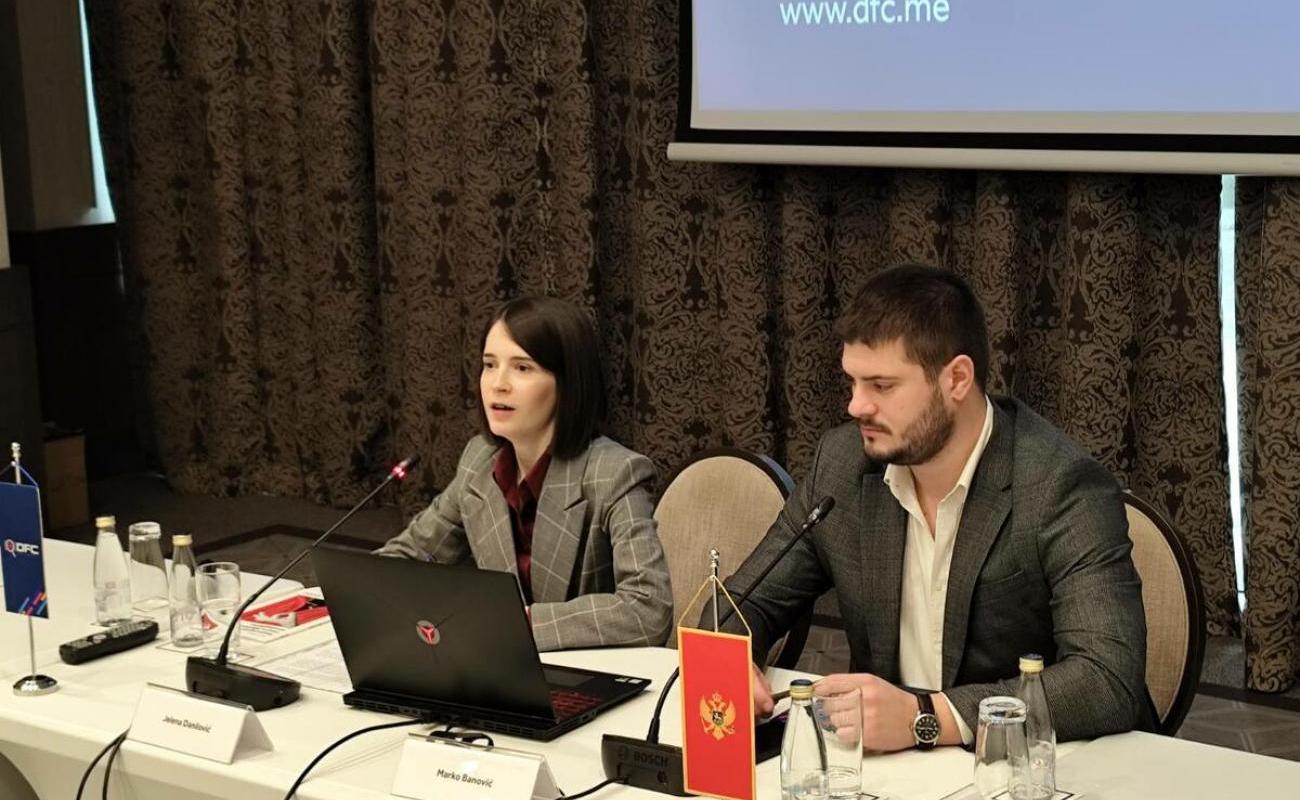Soft power instruments in hybrid strategies

A new study by the Digital Forensic Center (DFC) entitled Instruments of soft power in hybrid strategies, which was presented on December 5, 2024, analyzes the sophisticated hybrid activities carried out by the regime of Aleksandar Vučić in Montenegro.
DFC analyst Marko Banović said that certain countries that, like Montenegro, are in the process of European integration, have been stopped on their way due to foreign influence. "Therefore, it is important to keep this topic in focus and promote it further."
DFC analyst Jelena Danilović, presenting the study, said that the aim of the study is to point out the complexity of Serbia's interests in Montenegro, with a focus on political, media, cultural and religious aspects. She said that various mechanisms of soft power and malignant influence are being combined with the aim of strengthening the presence in the NATO member state, which is also the most serious candidate for membership in the European Union. "Hybrid approaches are calculated to undermine pro-Western policies and strengthen Serbian national interests promoted by numerous pro-Serbian proxy actors in Montenegro."
In the study, it was assessed that certain initiatives such as the one for establishing dual citizenship with Serbia and passing laws on foreign agents, if they were institutionalized, could result in blocking the process of Montenegro's approach to the European Union (EU). Danilović added that the government of Aleksandar Vučić victimizes the Serbian national and ethnic corps in the entire region and projects control of regional socio-political processes on such a matrix. Pro-Serbian structures in Montenegro accept the narrative of the victim and set political goals in accordance with it.
The study analyzes in detail the activities and values of the Serbian Orthodox Church (SPC), which plays a key role in the mobilization of citizens and the promotion of political options that are close to Serbian interests. The SPC uses spiritual influence and promotes a narrative about the Serbian roots of Montenegro, with numerous confabulations and historical revisionism and negationism and the denial of Montenegrin historical and cultural identity. It was emphasized that the key ideological concept in the program and activities of the SPC in the Western Balkans is ethnophiletism (religious and church nationalism).
One of the key mechanisms of influence is the dissemination of disinformation narratives through the media and social networks, which seek to destabilize the national identity of Montenegro. Placing pro-Russian and pro-Serbian narratives undermines the pro-Western orientation of Montenegro. Media narratives coming from Serbia become a powerful tool for shaping public opinion, especially in sensitive socio-political periods. The study pointed to an intensive propaganda campaign after the publication of the results of the population census, which included the activities of Russian media branches in Serbia, RT Balkan and Sputnik Serbia, then the RuSerbia portal, Serbian portals and television stations close to the regime in Belgrade, as well as domestic pro-Serbian and pro-Russian portals IN4S. Combat and Aloonline.
Serbia is actively trying to exert influence in the field of culture and education in Montenegro by using soft power in order to present certain values and ideas to the citizens of Montenegro as desirable and natural. That strategy includes educational initiatives and cultural projects in which Serbian and Russian values are promoted, presenting them as universal and those that Montenegro should inherit. A particularly intense role in the spread of Serbia's influence in Montenegro is played by numerous writers, publicists, journalists and academics, who work within organizations and associations with a pronounced Serbian sign.
In this context, the activities of Zelidrag Nikčević, writer, publicist and adviser to the President of the Parliament of Montenegro, Andrija Mandić, are characteristic. He publishes Russian propaganda daily through his Facebook profile, translating content from Russian media and Telegram channels.
Cinematography represents one of the important channels of soft power that can be used to shape public opinion, attitudes, and emotionally manipulate. The TV series "Fortress" produced by Radio Television of Serbia (RTS) is one example. The TV series Tvrđava directed by Saša Hajduković, whose sole and exclusive rights owner is RTS, was partly filmed in Montenegro. Although it was filmed in Nikšić and Belgrade, the series is set in Knin, Croatia, during the war years (1990-1995). The series is about the pogrom of Serbs from Croatia. On July 24, 2024, the Ministry of Culture and Media of Montenegro issued a decision approving the filming of the series Fortress on the territory of Montenegro. It was filmed in several locations in the municipality of Nikšić, and all those locations in the series will be presented as parts of Knin. The series was filmed with the support of the Municipality of Nikšić and the Tourism Organization of Nikšić. TO Nikšić allocated considerable financial resources in the amount of 200 thousand euros for the hotel accommodation of the team of the Tvrđava series. These funds are significantly higher than those received by Montenegrin film workers, for whose projects symbolic funds are allocated from the budgets of Montenegrin municipalities.
Hybrid activities of pro-Serbian political structures in Montenegro, under the influence of official Belgrade and pro-Russian actors, destabilize the civil character of the country and undermine its path to the European Union. The strategy, which uses the continuous sacrifice of national interests for the sake of regional political goals, can destabilize Montenegro in the long term, making it dependent on the interests of Belgrade and Moscow.
The study also provides concrete recommendations: primary focus on the European Integration process, timely implementation of constitutional reforms, strengthening of state institutions in the service of secularism and civil
values, improvement of control and monitoring mechanisms in the field of culture and education and strengthening of institutional capacities to combat disinformation narratives.
